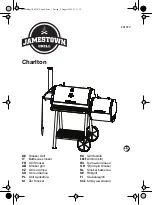
6
Using the ceramic glass hob
Ceramic glass surface
The glass is hard, and has been tempered to withstand
heat, cold and temperature shocks. But like all glass it
is sensitive to impact. Do not stand on the ceramic glass
surface.
If scratches or cracks are noticed, disconnect
the cooker from the electrical supply and call
you nearest Zanussi Service Force Centre.
Keep all objects and materials which can melt
away from the cooking surface, e.g. plastics,
aluminium foil.
Care should be taken when preparing food or drinks
containing sugar. If anything of this nature
accidentally comes into contact with the ceramic
surface it must be scraped off immediately while
stlll hot and wiped away to avoid damage to the
surface.
Energy consumption
To save energy, you should . .
- use only cooking and frying utensils with smooth, flat
bases.
- place pots and pans in position before switching on
the cooking zone.
- wherever possible, cover pots and pans with a lid.
- switch off the cooking zone a few minutes before the
end of the cooking time, in order to make use of the
residual heat.
- use the residual heat of the cooking zones for keeping
food warm or for melting.
- position pots and pans centrally on the cooking zones.
Saucepans and frying pans
Saucepans and frying pans should not be smaller than
the cooking zone, and preferably not more than 10-15
mm larger than the diameter of the cooking zone.
Always use cooking and frying utensils with smooth, flat
bases.
The bases should always be clean and dry. Cook with a
lid in place.
Check that the bases of utensils are smooth and
undamaged; bases with burrs and sharp edges will
scratch the ceramic glass surface.
To avoid scratching or damaging the ceramic cooking
surface, pots and pans should be moved on the plate by
lifting them, and not by sliding.
Utensils with aluminium and copper bases can leave
behind metallic discolorations which can only be removed
with difficulty or sometimes not at all.







































